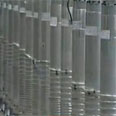
On July 25, in a rare public acknowledgement, Iranian Supreme Leader Ayatollah Ali Khamenei shed light on the detrimental impact of international sanctions on Iranian society. During a meeting with President Mahmoud Ahmadinejad and his political rival, Speaker Ali Larijani, Khamenei called for an end to infighting over Iran’s deteriorating economy, stressing the need for national unity.
"The reality is that there are problems, however you must not blame them on this or that party," Khamenei was quoted as saying by Fars News Agency. "Instead you must solve those problems with unity."
Pundits and politicians in the West should be in no rush to laud this admittance of Iran's floundering economy as a sign that the regime’s resilience in pursuit of nuclear capability has begun to waver. For those in Jerusalem grappling with a historic decision, sanctions have failed to achieve their baseline goal - suspension of the Iranian nuclear program.
Current sanctions aim to foment public discontent in Iran by inducing economic hardship, threatening to usher in a Persian edition of the Arab Spring. Recently implemented sanctions by the European Union have been rightfully hailed as the harshest to date, and there are indeed indications that this ban on oil imports has taken a toll on the Iranian economy.
Reduced participation in the international banking system due to American sanctions has forced Iran to trade through barter arrangements of commodities in place of hard currency. As a result, the rial has devaluated, contributing to rampant inflation. Official government estimates place inflation rates at 22.4% annually, but economists assert that it may be higher. This translates into soaring prices for common consumer goods like bread, whose price is 16 times higher than in 2010 when bread subsidies were withdrawn. Inflation has since contributed to domestic discontent, most recently when protests erupted in the northeastern Iranian city of Nishabur over the cost of chicken in July 2012.
On July 4, 2012, an official Iranian website (briefly) displayed the results of a public opinion survey, which indicated that 60% of those polled would forgo their country’s nuclear progress in exchange for an easing of sanctions. However, while the poll illustrates that resentment toward the government for economic hardship is growing, a significant portion of the population still blames the international community for using sanctions that disproportionately impact the public rather than the regime. Included in this group are Iran’s influential merchant and labor sectors. These segments of society played an important role in overthrowing the Shah in 1979, and any successful uprising would be short-lived without their participation.
Clock ticking down
The potential for domestic pressure to spur a decisive shift in the regime’s nuclear program itself currently remains limited as well. The ill-fated uprising attempts in 2008-09 and 2011-12 largely dealt with issues of democratic and political reform, not nuclear policy. Meanwhile, those sectors of society which encompass the regime’s power base view nuclear enrichment as a national entitlement, spelling dire political consequences for any reneging by the Ayatollahs on their pursuit of a seat at the nuclear table.
While sanctions may be gradually stirring discontent amongst the population, the rate at which they are doing so is slower than the progress of Iran’s suspected nuclear weapons program. Indeed, continued deadlocks in negotiations, provocative military exercises involving long-range missiles, and announcements on nuclear achievements illustrate the regime’s intentions to continue defying the West.
During the same July 25 meeting with Ayatollah Khamenei, President Mahmoud Ahmadinejad reportedly told the supreme leader that Iran has 10% more centrifuges operating in July 2012 than it had at the time of the last IAEA report in May 2012. With each declaration of progressing enrichment activity, Iran further toes Israel's red lines for military action.
It is no coincidence that following Ahmadinejad’s statement, Israeli Defense Minister Ehud Barak asserted that current sanctions "are not enough to stop Iran's nuclear program," and that Israel would have to make "tough and crucial decisions" about its security.
The endless line of Obama Administration officials rotating through Jerusalem will likely find little success in swaying Israeli policy makers to place their bets on current sanctions. For Israel's leadership, an Iranian bomb is considered an existential threat to survival of the Jewish State, and the stakes are too high to risk holding out for regime change.
With the clock ticking down toward Iranian nuclear breakout capability, those hopeful for a diplomatic solution for this potentially destructive crisis would be wise to switch time zones. Although the West’s sanctions continue to bite, the Ayatollah’s centrifuges continue to spin, ensuring that a regional conflagration is only a matter of time.
The authors are intelligence analysts at Max-Security Solutions , a geo-political risk consulting firm based in Tel Aviv, Israel.
Follow Ynetnews on Facebook and Twitter















